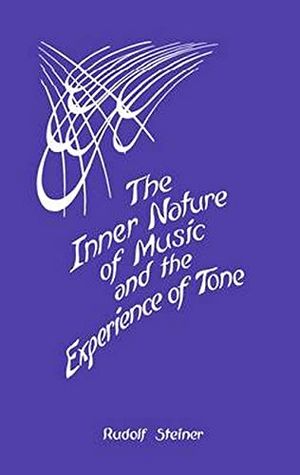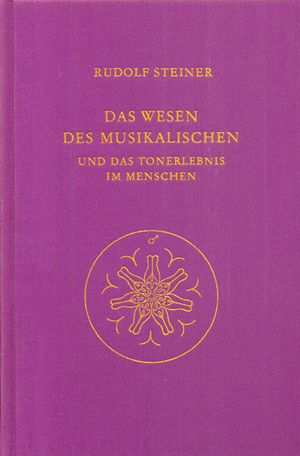GA 283


The Inner Nature of Music and the Experience of Tone
Das Wesen des Musikalischen und das Tonerlebnis im Menschen
Eight lectures, three answers to questions and two concluding remarks, given in various cities in the years 1906 and 1920 to 1923, with a list of the texts on music in Rudolf Steiner's work.
Contents
First lecture, Cologne, 3 December 1906
Schopenhauerian thoughts as a starting point for an occult contemplation of music - The ascent of the human soul through a spiritual development - The Devachan as the world of music of the spheres - Earthly music as an echo of the sounds perceived in higher worlds - The deeper meaning of major and minor.
Second lecture, Berlin, 12 November 1906
Goethe's and Schopenhauer's views on the significance of the arts - The three states of consciousness of man - The dwelling of the human soul in the Devachan and the experience of music of the spheres during dreamless sleep - Earthly music as an unconscious memory of this experience - Making conscious these connections through occult development.
Third lecture, Berlin, 26 November 1906
The Inheritance of Musical and Mathematical Talent in the Bach and Bernoulli Families - The Relationship of Individuality to the Inherited Dispositions - The Development of the Human Being in Past Earth Times - The Development of the Organs of Hearing, Speech and Equilibrium.
Fourth lecture, Leipzig, 10 November 1906
The views of Goethe on art and Schopenhauer on the special position of music - The further development of these thoughts by Richard Wagner - The significance of music from the occult point of view - The transformation of the lower members of man through the effect of music. Question Answer.
First answer to questions, Dornach, September 29, 1920
The development of music in the future - The extension of our tonal system through a new experience of the individual tone - The penetration of new impulses into the development of humanity and the difficulties connected with it - The connection of the musical with the breathing process and with the structure of the human being.
Second Answer to Questions, Dornach, September 30, 1920, in the Evening
On the nature of the artistic - The experience of the individual tone - The relations between colour, speech and song - The drift of dramatic art into the naturalistic - The origin of eurythmy from the occult observation of the human being - Goethe's relation to the theory of tone - A brief remark on methods of singing. Art and the observation of art. - Abstractness of some questions - Fairy tale observation, fairy tale interpretation.
Third answer to questions, Dornach, 20 December 1920
The importance of wood types in the construction of musical instruments - Problems of acoustics and room design - Geological conditions of a landscape and the musicality of its inhabitants - The newly built violin of Dr. Thomastik.
Fourth answer to questions, Dornach, February 7, 1921
The connection of the human being with the cosmic worlds, presented in a Chinese legend - The significance of music for ancient cultures.
Literature
- Rudolf Steiner, M. St.Goar (Translator): The Inner Nature of Music and the Experience of Tone. CW 283. Anthroposophic Press 1983. ISBN 978-0880100748 rsarchive.org
German
- Rudolf Steiner: Das Wesen des Musikalischen und das Tonerlebnis im Menschen, GA 283 (1989), ISBN 3-7274-2831-7 English: rsarchive.org German: pdf pdf(2) html mobi epub archive.org
 |
References to the work of Rudolf Steiner follow Rudolf Steiner's Collected Works (CW or GA), Rudolf Steiner Verlag, Dornach/Switzerland, unless otherwise stated.
Email: verlag@steinerverlag.com URL: www.steinerverlag.com. Index to the Complete Works of Rudolf Steiner - Aelzina Books A complete list by Volume Number and a full list of known English translations you may also find at Rudolf Steiner's Collected Works Rudolf Steiner Archive - The largest online collection of Rudolf Steiner's books, lectures and articles in English. Rudolf Steiner Audio - Recorded and Read by Dale Brunsvold steinerbooks.org - Anthroposophic Press Inc. (USA) Rudolf Steiner Handbook - Christian Karl's proven standard work for orientation in Rudolf Steiner's Collected Works for free download as PDF. |
